Toyota RAV4 (XA50) 2019-2026 Owners Manual: Checking and adding the brake fluid
Ō¢Ā Checking fluid level
The brake fluid level should be between the "MAX" and "MIN" lines on the tank.
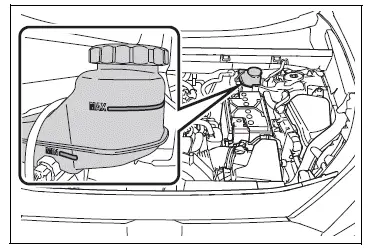
Ō¢Ā Adding fluid
1. Slide and lift up the rubber strip to partly remove it as shown.
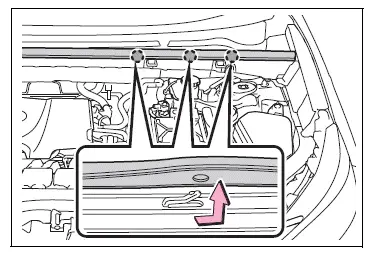
2. Disconnect the claws and remove the service cover.
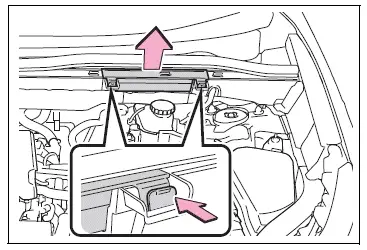
3. Remove the reservoir cap.
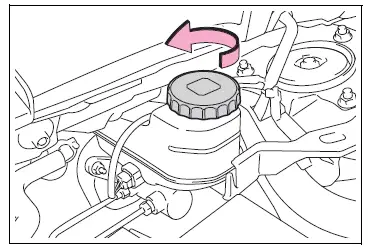
4. Add brake fluid slowly while checking the fluid level.
Make sure to check the fluid type and prepare the necessary item.
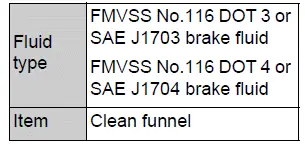
Ō¢ĀBrake fluid can absorb moisture from the air
Excess moisture in the brake fluid can cause a dangerous loss of braking efficiency. Use only newly opened brake fluid.
WARNING
Ō¢ĀWhen filling the reservoir
Take care as brake fluid can harm your hands and eyes and damage painted surfaces.
If fluid gets on your hands or in your eyes, flush the affected area with clean water immediately.
If you still experience discomfort, see a doctor.
NOTICE
Ō¢ĀIf the fluid level is low or high
It is normal for the brake fluid level to go down slightly as the brake pads wear out or when the fluid level in the accumulator is high.
If the reservoir needs frequent refilling, there may be a serious problem.
 Checking the coolant
Checking the coolant
The coolant level is satisfactory
if it is between the "FULL" and
"LOW" lines on the reservoir
when the engine is cold.
Reservoir cap
"FULL" line
"LOW" line
If the level is on or below the "LOW" ...
 Checking the battery
Checking the battery
Check the battery as follows.
Ō¢Ā Battery exterior
Make sure that the battery terminals
are not corroded and that
there are no loose connections,
cracks, or loose clamps.
Terminals
Hold-down clamp ...
Other materials:
Rear seat outer belt assembly
Components
...
Srs warning light does not come on
Description
The srs warning light is located on the combination meter.
When the srs is normal, the srs warning light comes on for approximately 6
seconds after the ignition
switch is turned from off to on, and then goes off automatically.
If there is a malfunction in the srs, the srs warni ...
Warning lights and indicators
The warning lights and indicators on the instrument cluster and
center panel inform the driver of the status of the vehicleŌĆÖs various
systems.
For the purpose of explanation, the following illustration displays
all warning lights and indicators illuminated.
Instrument cluster
Some indi ...
